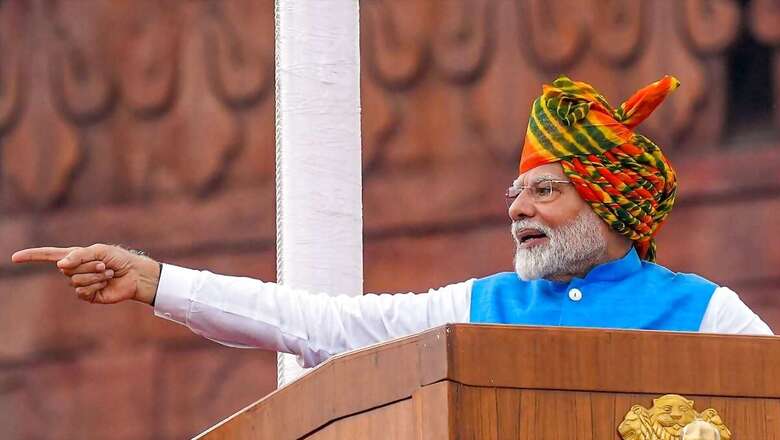
views
Since August 15, 1947, when Prime Minister Jawaharlal Nehru addressed a newly independent nation from the ramparts of the Red Fort, it has become an annual tradition for every prime minister to follow. The entire nation eagerly awaits the PM’s address, and for decades, the speech has been broadcast live across the country.
There is no prescribed format for the PM’s speech. It can touch on any issue, any theme, and engage with the people on any subject or subjects, depending on the PM’s choice. Nor is there a time limit for his speech. For the period that the PM is speaking, the nation is a captive audience, awaiting his or her message to the nation, as a guide, leader and mentor.
Many prime ministers of different political parties have addressed the nation on this auspicious day. Not all have been great speakers. Some, like Deve Gowda from the south, struggled with Hindi; others, such as Dr Manmohan Singh, were giant intellectuals but not mass leaders, and their speeches did not ignite the audience. Indira Gandhi spoke simple Hindi, or Hindustani, and held the attention of her audience. Atal Bihari Vajpayee, one of the greatest orators the country has seen, spoke extempore and effortlessly.
Narendra Modi is also a very gifted speaker. His natural eloquence and richness of Hindi vocabulary have been great assets to him as a political leader. He also has an acute sense of knowing the pulse of the people, of responding to their emotional senses, and generally using language as a tool to shape public opinion. Why then was his speech at this year’s Independence Day from the Red Fort so lacklustre?
Firstly, in my opinion, it was too long. He spoke for 98 minutes, the longest speech ever given by a PM from the Red Fort. A speech of this length begins to lose impact as the attention spans of the audience are shorter. The sultry, humid and hot weather did not help either. With live TV coverage of the event, the nation could see the audience growing restless—not only among the common people but also among the VIPs. Ministers were fanning themselves, some were swatting away mosquitoes, and others were trying to shield themselves from the sun.
The discomfort of the diplomats present was pitiable. As befitting the occasion and in line with protocol, they were mostly formally dressed in suits, and must have been feeling extremely hot and sweaty under the collar. Having been a diplomat, I know that sense of being trapped. In communist Romania in the early 1980s, where I was posted, President Ceausescu would speak for hours, and while the Romanian audience had no choice but to periodically cheer him, diplomats would wonder when the ordeal would finally end.
Secondly, the Red Fort speech is not meant to be a narration of the minutiae of the government’s achievements. That is typically covered in the Rashtrapati’s traditional address at the opening of Parliament for the Budget session and can also be detailed in press releases from the Press Information Bureau (PIB). While the PM can certainly highlight the most significant achievements, providing too much detail is, in my view, unnecessary. It consumes too much time, and after a while, the sheer recitation of numbers or statistics loses its impact, especially since they have already been frequently cited by government spokespersons and ministers both in Parliament and elsewhere.
Thirdly, what the nation anticipates from the PM on such an occasion are a few broad and relevant messages in a speech that should ideally not exceed 45 minutes. These messages don’t necessarily have to support his government or party but should resonate collectively with the nation. Some of the issues could include his resolve to address pressing problems such as unemployment, inflation, the plight of farmers, the quality of education, healthcare, national security, and India’s influence in the world.
It is up to the PM to prioritise these issues, but announcing concrete schemes with specific deadlines for some of them would go a long way in convincing both critics and undecided voters of the government’s sincerity and determination in finding solutions. Overloading the speech agenda can cause many important points to be overlooked, diluting the focus and centrality of the speech.
After the setback to the BJP in the last national elections, where it failed to secure a majority on its own, a long, meandering speech on such an important occasion was a missed opportunity to regain lost ground and reassure the country that the best person to lead the nation is still at the helm. This is why, in other democracies, leaders are mandatorily assisted by a team of speechwriters and strategy sessions on content and delivery to decide what they should say. Having been a speechwriter for one PM and two Presidents of India myself, I understand the importance of this preparatory work.
There are few better orators in the country today than Narendra Modi. He should use this asset to maximum advantage in the future.
The author is a former diplomat, an author and a politician. Views expressed in the above piece are personal and solely those of the author. They do not necessarily reflect News18’s views.













Comments
0 comment